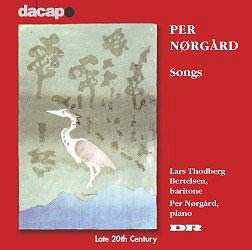I have set out the recorded songs above chronologically
and not in the order in which they are recorded because I want the reader
to understand that they represent examples of the genre composed by
Norgard over almost a forty-year period. He has written songs regularly
and consistently throughout his life and his various stylistic changes,
which one finds in more public works like the symphonies, are reflected
also in these pieces.
I have always admired Norgard’s First Symphony ‘Sinfonia
austera’ of 1955, and whilst assimilating this CD I listened again
to that work (Chandos CHAN 9450). Unsentimental, craggy and yes, austere.
I was expecting to hear that work reflected in the songs from the early
1950s, written when the composer was still a pupil of Vagn Holmboe.
I did not listen to this CD in the recorded order but began with the
Op.2, settings of Paul la Cour (tracks 6-8). This is tough music just
as expected. The excellent CD booklet notes by Ivan Hansen talk of their
"autumn-dark" mood, and of "their weighty character".
Like other settings in this collection these songs are full of impressions
of Jutland with its "resentful rocks, ripped from the bowels of
the earth". This granitic music is the Norgard I know, but somehow
can’t love.
I was in for a surprise however with the Op.14 songs.
These are scattered around the CD disrupting the moods just in case
you felt like playing it right through; something I would not recommend.
I can’t imagine that DACAPO really thought that would happen. If the
recording had been presented chronologically it would have made more
sense. However, these songs are often folk-inspired. The folk influence
is betrayed by attractive, memorable tunes, use of modality (even if
it is chromatically coloured) and the nature of the chosen texts. A
good example is ‘My Leaves, my little tree/Green now, my little tree/
Rock him, you green boughs". This is a poem by Jobs V. Jensen and
the song opens the CD.
At times there is an innocence about these pieces.
‘Dream Songs’ (track 12) begins unaccompanied in the manner of folksong.
The entry of the piano adds to the pastoral atmosphere. It comes as
quite a surprise to discover that this song is from 1981/7.
But in fact we have jumped ahead too soon. We should
return to the period around 1960 when Norgard started to use serial
technique. This was at the time of his last works to be given an opus
number: the six songs Op.27. At the time these would have been at the
cutting edge of the avant-garde. Not only are they atonal but the piano
accompaniments are often pointillistic in the extreme. The baritone
is asked to employ parlando, (completely so in Song 1) and sprechgesang
in the style of Schoenberg’s ‘Pierrot Lunaire’ and Berg’s ‘Wozzeck’.
Curiously enough Lars Thodberg Bertelsen who, up to this point chronologically
speaking, has been rather gentle, even under characterising the songs
suddenly emerges as a singer-actor with a very fine musicianly grasp
of the power of this complex music. These pieces really come alive in
a way that the earlier ones did not but how old-fashioned they now seem.
Norgard created something he called ‘an infinite series’.
This helped develop his language still further in the ’sixties and ’seventies,
leading us to the song ‘Aret’ (the year) of 1976, completed shortly
after the 3rd Symphony. The infinite series basically
allows for diatonic as well as chromatic tone rows. This permits the
symphony to radiate the general feeling of a tonal core around which
a gamut of sounds can operate: harmonics, cluster chords etc. This style
is represented in ‘Aret’.
Norgard moved on from this using tonality in a more
original way as in the last songs. These are represented particularly
by the ‘3 Magdalene-sange’. These are predominantly slow and deeply
expressive. The second one ‘Drommestemmer’ allowing, in its onomatopoeia
a long humming note for ‘dromme’ etc.
The speed of many of the songs is slow or of a medium
tempo. This is quite in character with most Scandinavian songs, Sibelius
for example and Nystroem. The occasional lighter song like ‘Drommesang’
(track 12), with its unusual phrase lengths and catchy offbeat refrain,
makes a very pleasant respite.
The last song on the CD, ‘Star Mirror’ of 1987, is,
in my view, utterly tedious. We hear an uninteresting melody over rather
unhelpful harmonies repeated for each of the nine verses. Surely another
song from this period might have been chosen. It ends the CD somewhat
unfortunately.
There is no doubt that having Norgard as accompanist
is quite an attraction. Surely these are authentic performances, the
composer admits as much in his little accompanying comments when he,
quite rightly, praises Lars Bertelsen. He is technically on top of everything
and is recorded in an ideal balance throughout.
The jury is still out on Norgard. I wasn’t so impressed
with the recent 6th Symphony heard at the Proms, and these
songs are a mixed bunch. I can’t say that I go much on his choice of
poetry either. A Danish friend of mine read them and agreed that the
translations by James Manley were eloquent and poetic but said openly
that the poems were all second-rate or worse. Still, second-rate poetry
can make first-rate music, and sometimes it almost does. The more I
have listened the more I have enjoyed, so I can only say, try it for
yourself.
Gary Higginson


